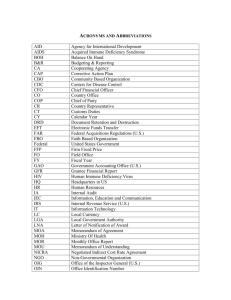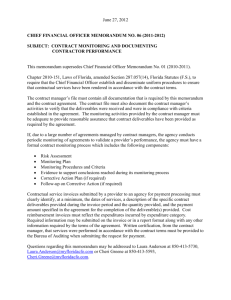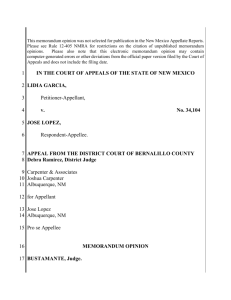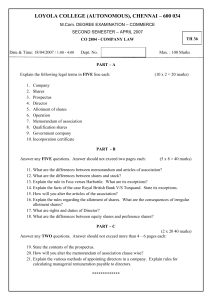Article of Association (2)
advertisement
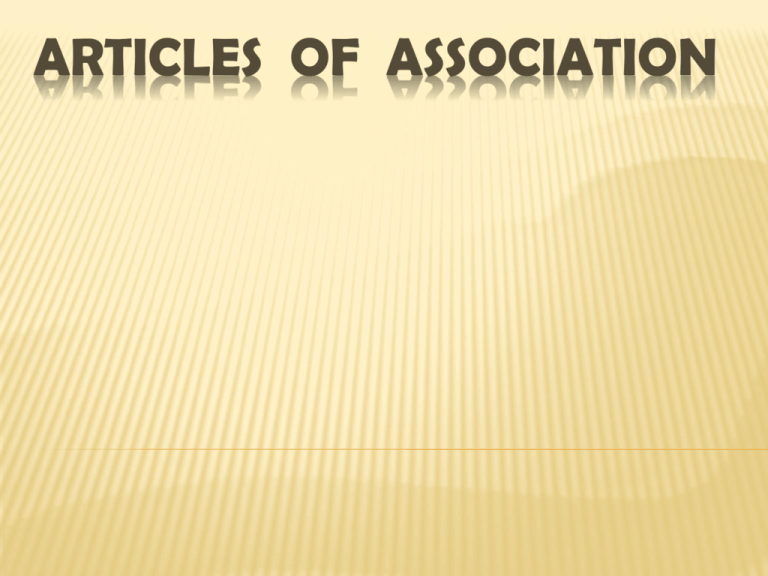
ARTICLES OF ASSOCIATION MEANING According to section 2(5) of the Companies Act 2013 ‘articles’ means: The articles of association of a company as originally framed or as altered from time to time in pursuance of any previous companies law of this Act. The articles of association contains the rules & regulations of a company framed for the purpose of management of its internal affairs. They define the powers of its officers. The articles are framed for carrying out the aims & objects of the memorandum of association. The articles of association of a company are subordinate to & are controlled by the memorandum of association. The memorandum of association contains only the fundamental conditions upon which alone the company is allowed to be incorporated. Compulsory to have articles. u/s 5(1) & 7(1)(a) of 2013 Act, it is compulsory for every company to have its own articles & file the same with ROC for registration. MODEL FORM OF ARTICLES Schedule 1 to the Act gives various model forms of Memorandum of association & articles of association for various types of companies. The schedule is divided in to tables which serve as a model for various companies. Articles of a public company limited by shares: section 5(7) provides that a company may adopt all or any of the regulations contained in the model articles applicable to such company. Therefore, a company may either:- 1. 2. 3. Formulate & register articles of its won within the provisions of the Act & the memorandum of association; or Adopt all or any of the regulations contained in the model articles (table F); or Partially adopt table F & also have its own articles. Articles of a private company: a private company must have articles of its own which must contain the restrictions as provided in section 2(68) of the Companies Act, 2013. therefore , without following these restrictions in its articles it can’t have the status of a private company. The company shall have a minimum paid up capital as may be prescribed from time to time under the Companies Act, 2013. It further1) Restricts the right to transfer its shares; 2) Except in case of one person company, limits the number of its members to 200: provided that where two or more persons hold one or more shares in a company jointly, they shall, for the purposes of this clause, be treated as a single member. Following shall not be included in the number of members: a) Persons who are in the employment of the company; & b) Persons who, having been formerly in the employment of the company, were members of the company while in that employment & have continued to be members after the employment ceased, 3) Prohibits any invitation to the public to subscribe for any securities of the company. Articles of guarantee & unlimited companies As per section 5(6) of the Act the articles of association of any company, not being a company limited by shares, shall be in such one of the Forms in tables G, H, I & J in schedule I as may be applicable, or in a form as near thereto as circumstances admit. The articles of the above types of companies, which do not have share capital, may follow the pattern as prescribed in the act as under:Table ‘G’- articles of association of a company limited by guarantee & having a share capital. Table ‘H’- Articles of association of a company limited by guarantee & not having share capital. Table ‘I’- Articles of association of an unlimited company & having a share capital. Table ‘J’- Articles of association of an unlimited company & not having share capital. Printing & signing of articles [section 7(1)(a)]. The articles must be printed & divided in to paragraphs, numbered consecutively. The Articles of Association printed on computer laser printers should be accepted by the Registrar for registration of a company provided they are neatly & legibly printed. CONTENTS OF ARTICLES The Articles of a company may contain whatever rules the members decide should regulate the business of the company. Utmost care must be taken to prepare the articles of association of the proposed company. Everything stated in the articles is subject to the Companies Act. The articles can’t authorize anything expressly or impliedly forbidden by the act. Any clause which is contrary to the provisions of the act is simply inoperative & void. Example:- the articles provided that no winding up petition could be presented without the consent of two directors or unless a resolution to wind up was passed at a general meeting or the petitioner held one – fifth of the share capital. None of these conditions was fulfilled . Held, the restrictions were invalid & the petition could be presented. [Re Peveril Gold Mines ltd. (1898) 1. ch.122 C.A.]. The articles usually contain rules regarding following matters: 1. 2. 3. 4. 5. 6. 7. 8. 9. 10. Adoption of preliminary contracts. Allotment of shares. Lien on shares. Forfeiture of shares. Conversion of shares in to stock. Meetings. Borrowing powers. Accounts & audit. Calls on shares. Alteration of capital. ALTERATION OF ARTICLES (SECTION 14) A company has a statutory right to alter its articles of association. The company contract itself out of its inherent statutory power to alter its articles & provide that any of its articles are remain unaltered. Thus, a provision in the articles that no alteration of articles shall be made without the consent of X is contrary to the provisions of Companies Act & is therefore ineffective or void. A company can never replace its articles. It is only regulations contained therein which may be changed. ALTERATION OF ARTICLES UNDER ORDER OF THE NATIONAL COMPANY LAW TRIBUNAL (SECTION 241-242) The alterations made under an order of the tribunal shall have the same effect as if they were made by the company in accordance with the act. The company must file a certified copy of the order with the Registrar within 30 days of the issue of that order. Procedure: subject to the provisions of the Act & to the conditions contained in its memorandum, a company may by a special resolution alter or add to its articles. The company must file with the registrar a copy of the special resolution within one month from the date of its passing. The altered articles will bind the members in the same way as did the original articles. A company can alter its articles of association at any time by passing a special resolution. LIMITATIONS ON POWER TO ALTER ARTICLES Must not be against the provisions of Act. Must not be inconsistent to the Memorandum. Must not sanction anything illegal. Not be inconsistent with any alteration made by Tribunal [sec. 404]. Approval of Central Government for conversion of public company into private company. No increase in the liability of members. Alteration by special resolution only. Should not cause breach of contract. Must be for the benefit of the company. Fraud on the minority. Retrospective alteration. Articles cannot be made unalterable. An alteration of articles with permission of Central Government only section 14. BINDING EFFECT OF MEMORANDUM & ARTICLES This section aims to impart contractual force to the memorandum & articles. The effect of these provisions is to constitute through the memorandum & the articles of association of a company a contract between each member & the company. The effect & the implications of this section may be appreciated by considering how far the memorandum & the articles bind1. The members to the company, 2. The company to the members, 3. The members inter se, 4. The company to the outsiders. CONSTRUCTIVE NOTICE OF MEMORANDUM & ARTICLES OF ASSOCIATION The memorandum & articles of association of every company are required to be registered with the Registrar of Companies. The office of the registrar is a public office & consequently the memorandum & the article on registration become public documents. They are open & accessible to all. These documents are open for public inspection on payment. Every one dealing with the company, whether a shareholder or an outsider is presumed to have read the two documents. He will be presumed to know the contents of these documents. This deemed knowledge of the two documents & their contents is known as the constructive notice of memorandum & articles. The parties dealing with the company must be taken not only to have read these documents but also to have understood them according to their proper meaning. When a person deals with a company in a manner which is inconsistent with the provisions of the memorandum or articles, or enters into a transaction which is beyond the scope of the powers of the company, he must take the consequences in respect of such dealings. Example- the articles of a company required that all deeds & other important documents should be signed by the managing director, the secretary & a working director on behalf of the company. The plaintiff accepted a deed of mortgage executed by the secretary & the working director only. It was held that the plaintiff could not claim under this deed as the bond was invalid. The court applied the doctrine of constructive notice in favors of the company.[kotla Venkataswamy v. Ram Murthi AIR 1934 Mad. 579]. DOCTRINE OF INDOOR MANAGEMENT The doctrine of indoor management is an exception to the rule of constructive notice. A person dealing with a company is deemed to have knowledge of the memorandum & the articles of association of the company. So, if he enters into a transaction with the company which is ultra virus of the memorandum or articles, he can’t treat the transaction as binding on the company. On the other hand, if the transaction appears to be proper one , when compared with the memorandum & articles, it would be grossly unfair if the company could escape liability under it by showing that there was some irregularity in the conduct of the company’s affairs leading up to the transaction, when the other party did not know of the irregularity & has no means of discovering it. ROYAL BRITISH BANK V. TURQUAND (1856) 6E & B. 327]. Point decided is:- the outsiders dealings with the company are entitled to presume that as far as the internal management of the company is concerned, every thing has been regularly done. Facts of the case are: The articles of a company stated that the directors could borrow money on behalf of the company, if they are so authorized by a resolution passed by the shareholders in general meeting. The directors borrowed money from Mr. T without obtaining any authorization from shareholders. T had lent the money to the company assuming that the shareholders had authorized the directors to borrow money as per the requirements of the articles. It was held that borrowing of money by the directors without any authorization from the shareholders amounted to a mere internal irregularity & further held that Mr. T could sue the company on the strength of the bond as he was entitled to assume that necessary resolution had been passed. EXCEPTIONS Knowledge of irregularity. Negligence. Forgery. Acts outside the apparent authority. No knowledge of the contents of articles. COMPANY SECRETARY’S DUTIES FOR ALTERATION OF AOA Board meeting Consent of members General meeting Validity of ordinary resolution Special resolution Changes in articles must be given in explanatory statement Alteration regarding directors Conversion of public company into private company Copy of articles Stock exchange Noting of alteration
